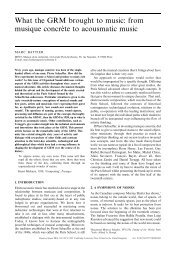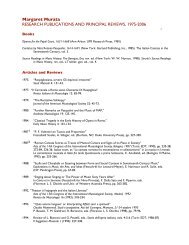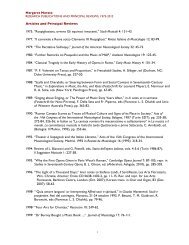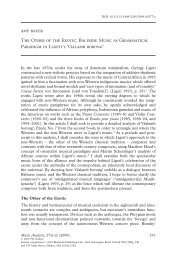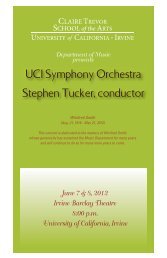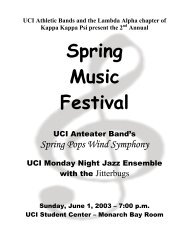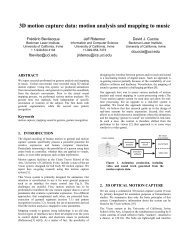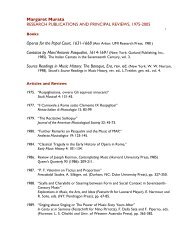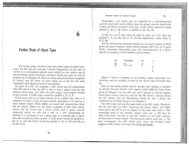âRoots and Branchesâ - Music - University of California, Irvine
âRoots and Branchesâ - Music - University of California, Irvine
âRoots and Branchesâ - Music - University of California, Irvine
Create successful ePaper yourself
Turn your PDF publications into a flip-book with our unique Google optimized e-Paper software.
R. Nathaniel Dett<br />
Born in 1882, R. Nathaniel Dett received his musical education at the Oliver Willis Halstead Conservatory in Lockport, NY, Oberlin College (BM, 1908,<br />
composition <strong>and</strong> piano), <strong>and</strong> the Eastman School <strong>of</strong> <strong>Music</strong> (MM, 1938). During the years 1920 - 1921, he studied with Arthur Foote at harvard, winning<br />
prizes for his choral compositions <strong>and</strong> for his essay, "The Emancipation <strong>of</strong> Negro <strong>Music</strong>." Dett did further study with Nadia Boulanger in France during the<br />
summer <strong>of</strong> 1929. His teaching tenures included Lane College in Tennessee, Lincoln Institute in Missouri, Bennett College in North Carolina, <strong>and</strong> Hampton<br />
Institute in Virginia. He was an instructor <strong>of</strong> Dorothy Manor at Hampton <strong>and</strong> developed the choral ensembles which received international acclaim <strong>and</strong><br />
recognition. Dett was a protege <strong>of</strong> E. Azalia Hackley, who helped to encourage his interest in Black folk music. His compositional works reflect the melodic<br />
<strong>and</strong> rhythmic sounds <strong>of</strong> Black music. Among his larger works were The Ordering <strong>of</strong> Moses, Magnolia Suite <strong>and</strong> for piano. He died in 1943.<br />
Harry Lawrence Freeman<br />
Harry Lawrence Freeman was one <strong>of</strong> the first important black composers for the operatic stage, <strong>and</strong> his first work, The Martyr, was the first opera ever<br />
produced by all-Black forces. Athough he was more successful in his lifetime than many <strong>of</strong> his contemporaries, his work has since faded into obscurity. In<br />
addition to composing <strong>and</strong> conducting, he was an impressario <strong>and</strong> a teacher, teaching at Wilberforce <strong>University</strong> in Chicago <strong>and</strong> the Salem School <strong>of</strong> <strong>Music</strong>,<br />
<strong>and</strong> founding the Freeman School <strong>of</strong> <strong>Music</strong> <strong>and</strong> the Freeman School <strong>of</strong> Gr<strong>and</strong> Operas. Many <strong>of</strong> his works were premiered by companies he founded, <strong>and</strong><br />
starred his wife, Carlotta. As a prominent black musical citizen <strong>and</strong> opera composer, Scott Joplin consulted him regarding Joplin's opera, Treemonisha.<br />
Freeman's three operas, Nada the Lily, Allah, <strong>and</strong> The Zulu King, formed a trilogy <strong>of</strong> Zulu history called Zulul<strong>and</strong>, after the Zulu history novels <strong>of</strong> H. Rider<br />
Haggard. (Haggard's books are entitled Nada the Lily, Marie, Child <strong>of</strong> Storm, <strong>and</strong> Finished.) It is likely that Chaka, The Ghost Wolves, <strong>and</strong> The Storm<br />
Witch (all given in Hipsher but not in other sources) are early or inaccurate titles for these four operas. New Grove gives the total number <strong>of</strong> his operas at 14.<br />
In addition to his operas, Freeman composed many works for other genres, including his symphonic poem, "The Slave", for orchestra <strong>and</strong> chorus.<br />
Contemporary reviews are <strong>of</strong>ten examples <strong>of</strong> the racist code used by the newspapers <strong>of</strong> the time; for example, one review <strong>of</strong> Voodoo was headlined:<br />
"'Voodoo,' Bizarre Work <strong>of</strong> Basic <strong>Music</strong>, In Premiere", <strong>and</strong> called the opera "a thing so hideously bizarre that it was beautiful."<br />
Adolphus Hailstork<br />
Adolphus Hailstork received his doctorate in composition from Michigan State <strong>University</strong>, where he was a student <strong>of</strong> H. Owen Reed. He had previously<br />
studied at the Manhattan School <strong>of</strong> <strong>Music</strong>, under Vittorio Giannini <strong>and</strong> David Diamond, at the American Institute at Fontainebleau with Nadia Boulanger,<br />
<strong>and</strong> at Howard <strong>University</strong> with Mark Fax. Dr. Hailstork has written numerous works for chorus, solo voice, piano, organ, various chamber ensembles, b<strong>and</strong>,<br />
<strong>and</strong> orchestra. His works for solo voice include the cycles: SUMMER. LIFE. SONG., THREE SPIRIT SONGS, VENTRILOQUISTS ACTS OF GOD,<br />
SONGS OF LOVE AND JUSTICE, <strong>and</strong> FOUR ROMANTIC LOVE SONGS. Additionally, prominent solo roles are included in large choral works such as<br />
I WILL LIFT UP MINE EYES, DONE MADE MY VOW, <strong>and</strong> CHRISPUS ATTUCKS. His operas include PAUL LAURENCE DUNBAR:COMMON<br />
GROUND, JOSHUA’S BOOTS, <strong>and</strong> RISE FOR FREEDOM (JOHN P. PARKER).<br />
Jacqueline Hairston<br />
Jacqueline Hariston, pianist, composer <strong>and</strong> arranger, received her musical training at the Julliard School <strong>of</strong> <strong>Music</strong> <strong>and</strong> at Howard <strong>University</strong> School <strong>of</strong><br />
<strong>Music</strong>. She earned a Masters degree in music <strong>and</strong> music education from Columbia <strong>University</strong> in New York City. In addition to her work as a pianist <strong>and</strong><br />
vocal coach, she is a prolific composer <strong>and</strong> arranger. Her works have been recorded by the London Symphony <strong>and</strong> the Columbia Symphony Orchestras <strong>and</strong><br />
have been performed by the San Francisco Women’s Philharmonic, Linda Tillery <strong>and</strong> the Cultural Hertiage Choir, Kathleen Battle (with the Collegiate<br />
Chorale <strong>and</strong> Pro Arte Chorale at Carnegie Hall), Metropolitan Opera mezzo soprano Denyce Graves <strong>and</strong> the Orl<strong>and</strong>o Opera Chorus <strong>and</strong> Orchestra <strong>and</strong> many<br />
other singers worldwide. Her compositions include musical settings for the inspirational words <strong>of</strong> Howard Thurman, her chaplain at Howard <strong>University</strong>. In<br />
2001, Ms. Hairston was artist-in-residence at Northern Illinois <strong>University</strong> conducting choral classes culminating in a concert commemorating her cousin, the<br />
late Dr. Jester Hairston, the “Amen” man who directly impacted her choral arrangements <strong>of</strong> spirituals. Her recent teaching posts have included Oakl<strong>and</strong>’s<br />
new School <strong>of</strong> the Arts, the <strong>University</strong> <strong>of</strong> Creation Spirituality <strong>and</strong> the <strong>University</strong> <strong>of</strong> <strong>California</strong>, Berkey’s Young <strong>Music</strong>ians’ Program.<br />
Charles Ingram<br />
Charles Ingram (b. 1951) is a native <strong>of</strong> Gulfport, Mississippi. In 1968 he won first place in the state composition contest for high school students, which was<br />
sponsored by the Mississippi Arts Council <strong>and</strong> the <strong>University</strong> <strong>of</strong> Southern Mississippi. In 1969 he attended USM where he majored in Theory-Composition.<br />
In 1975 he completed the Master <strong>of</strong> <strong>Music</strong> degree in choral music at the <strong>University</strong> <strong>of</strong> Southern <strong>California</strong>. He began teaching at Los Angeles Southwest<br />
College in 1976. In 1985, he returned to USM for doctoral studies in composition with Luigi Zaninelli. He has composed for chorus, orchestra, wind<br />
ensemble, solo voice <strong>and</strong> various chamber ensembles. He retired Los Angeles Southwest College in 2008. His song cycle, Six Songs for Kimberley were<br />
premiered by soprano, Dr. Kimberley Davis in January 2010. Dr. Davis also premiered Songs <strong>of</strong> Solomon in April 2011. His latest songs are on poems by<br />
Langston Hughes, A Dream Deferred <strong>and</strong> Dream Boogie. His setting <strong>of</strong> Go, Lovely Rose for SSAA <strong>and</strong> solo horn <strong>and</strong> his arrangement <strong>of</strong> the spiritual, I<br />
Wanna Be Ready were premiered by Miami <strong>University</strong> <strong>of</strong> Ohio Choraliers <strong>and</strong> Chamber singers in 2011.<br />
Lena McLin<br />
Lena McLin attended the public schools <strong>of</strong> Atlanta <strong>and</strong> Chicago <strong>and</strong> received the B.M. in piano <strong>and</strong> violin from Spelman College, Atlanta, Georgia. Her<br />
teachers were Florence Brinkman Boyton in piano <strong>and</strong> Leonora Brown <strong>and</strong> Willis Lawrence James in theory <strong>and</strong> composition. She studied electronic music<br />
<strong>and</strong> voice at Roosevelt <strong>University</strong>, Chicago. She completed her M.M. at the American Conservatory <strong>of</strong> <strong>Music</strong>, Chicago, where she studied music theory <strong>and</strong><br />
counterpoint under Stella Roberts <strong>and</strong> piano under Howard Hanks. McLin's compositions include cantatas, masses, solo <strong>and</strong> choral arrangements <strong>of</strong><br />
spirituals, anthems, art songs, rock operas, soul songs, works for piano <strong>and</strong> orchestra, <strong>and</strong> electronic music. Among her compositions are: Gwendolyn<br />
Brooks: A musical portrait (SATB); Song Cycle (SATB); Free At Last, cantata; Psalm 117 (SATB); The Little Baby (SATB). Her musical style reflects but<br />
is not limited to the influence <strong>of</strong> the church <strong>and</strong> gospel music. Her choral works include natural word rhythms, syncopated rhythms, <strong>and</strong> imitation.<br />
Undine Smith Moore<br />
Born in 1904, Undine Smith Moore began publishing relatively late in her career <strong>and</strong> belongs to that group <strong>of</strong> Black composers who had long teaching<br />
careers at Black colleges in the South. She taught music for forty-five years at Virginia State College, Pertersburg, Virginia, where her students included<br />
such outst<strong>and</strong>ing musicians as Billy Taylor, Leon Thomspon, Louise Toppin, <strong>and</strong> Camilla Williams. Moore graduated with highest honors from Fisk<br />
<strong>University</strong>, Nashville, Tennessee, <strong>and</strong> was awarded the first scholarship to Julliard School given to a Fisk graduate. She received the MA <strong>and</strong> a Pr<strong>of</strong>essional<br />
Diploma in <strong>Music</strong> from Columbia <strong>University</strong>, New York. An honorary Doctor <strong>of</strong> <strong>Music</strong> degree was awarded to Moore by Virginia State College (1972) <strong>and</strong><br />
Indiana Unviersity (1976). Moore's compositional output includes choral works, solo works for voice, flute, piano, <strong>and</strong> chamber works. Some <strong>of</strong> her more<br />
familiar compositions are Afro-American Suite for flute, violoncello, <strong>and</strong> piano; Lord, We Give Thanks to Thee for chorus, "Daniel, Servant <strong>of</strong> the Lord," for<br />
chorus, <strong>and</strong> "Love, Let the Wind Cry How I Adore Thee." Her oratorio, Scenes from the Life <strong>of</strong> a Martyr, on the life <strong>of</strong> Martin Luther King, Jr., was<br />
nominated for a Nobel Prize. She died in 1988.<br />
Gary Powell Nash<br />
Gary Powell Nash is Associate Pr<strong>of</strong>essor <strong>of</strong> <strong>Music</strong> at Fisk <strong>University</strong> in Nashville, TN where he teaches <strong>and</strong> coordinates courses in music theory,<br />
technology, applied woodwinds <strong>and</strong> conducts the Fisk Jazz Ensemble. Nash has composed musical works for orchestra, b<strong>and</strong>/wind ensemble, choir, art<br />
songs, electroacoustic works <strong>and</strong> instrumental chamber compositions, including two short film scores. His music has been performed in all major regions <strong>of</strong>



